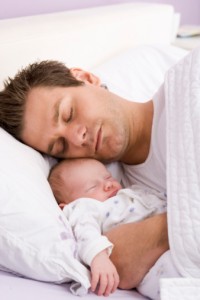The Testosterone Tradeoff: Hormone Decrease Makes Better Fathers

(BananaStock)
It’s official: having a baby will lower your testosterone. If you’re a man, of course. And while this may seem scary and vaguely emasculating, it’s actually a good thing, according to a new study by researchers at Northwestern University. While testosterone is good for some activities, like competing for a mate, it’s not great for other activities, like nurturing a newborn baby.
From the abstract:
In species in which males care for young, testosterone (T) is often high during mating periods but then declines to allow for caregiving of resulting offspring. This model may apply to human males, but past human studies of T and fatherhood have been cross-sectional, making it unclear whether fatherhood suppresses T or if men with lower T are more likely to become fathers. …Our findings suggest that T mediates tradeoffs between mating and parenting in humans, as seen in other species in which fathers care for young. They also highlight one likely explanation for previously observed health disparities between partnered fathers and single men.
Testosterone levels plunged even lower depending on how involved the father is with child rearing. Unlike previous studies, this one followed a group of 624 Filipino men for 4.5 years, a period of time that allowed researchers to clearly test hormone levels before and after fatherhood.
It’s important to note that unlike mothers, who undergo a major physical change with the birth of a child, testosterone changes only affect fathers who are actively involved in the life of their child.

Comments